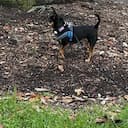Origins and Temperament
The Bernese Mountain Dog, hailing from the Swiss Alps, was historically a farm dog bred for herding livestock and pulling carts. Known for their gentle and friendly nature, these dogs often exhibit a strong loyalty to their families, making them excellent companions. The calm and patient temperament of the Bernese Mountain Dog is an asset during travel; however, their size and attachment to their owners can impact their comfort and stress levels while on the move.
Size and Physical Needs
Typically weighing between 70 to 115 pounds, Bernese Mountain Dogs are robust with a thick, tricolored coat. They require frequent exercise to maintain their health but are not considered overly energetic. As a large breed, they need ample space to stretch out during transport and might need help entering and exiting vehicles. Their thick coat also means they can easily overheat, making climate-controlled environments essential for their comfort and safety.
Common Health Considerations
Bernese Mountain Dogs can be predisposed to certain health conditions like hip dysplasia and bloat, which must be considered when planning travel. Health documentation, including vaccination records, a recent health certificate, and proof of any ongoing treatments, should be arranged in advance. Preventative measures, such as withholding food for a few hours before traveling to prevent bloat, should be taken to ensure a safe trip.
















